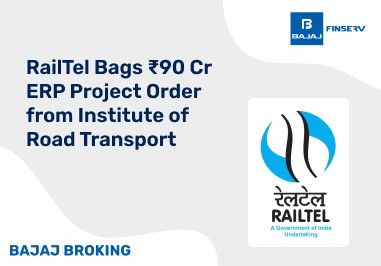BAJAJ BROKING
Ather Energy IPO is Open!
Open a Free Demat Account
Trade Now, Pay Later with up to 4x
Track Market Movers Instantly
How to Save the Physical Shares From Getting Frozen by RTA?
Synopsis:
Discover how converting physical shares to Demat form will help you protect your capital. Learn how to handle the dynamic stock market, protect your financial future, and comply with SEBI laws.
Regulatory changes frequently influence how investors manage their portfolios in the securities market. One such change requires physical share certificates to be converted to dematerialised form. This change simplifies share transactions while also complying with regulatory requirements. Knowing how to dematerialise your assets to prevent the Registrar & Transfer Agent (RTA) from freezing your physical shares is a critically essential thing to do.
Highlights of the Blog:
Importance of Dematerialisation
Step-by-Step Guidance
SEBI Compliance
Understanding the Importance of Dematerialisation
A vital component in improving market efficiency and safeguarding the securities you hold is the dematerialisation of physical shares. SEBI's recommendations highlight the critical importance of this shift to increase transparency and simplify share transactions. You can be in compliance with regulations and protect your assets from possible risks by keeping your PAN, KYC, and nomination information up to date. The Registrar & Transfer Agent (RTA) has the right to freeze physical shares if those requirements are not met. To secure your financial interests and explore the evolving securities market, it is essential that you understand and utilise the process of dematerialisation.
Steps to Apply for a Demat Account
Choosing a Depository Participant (DP): To get started, choose a DP that is registered with SEBI, CDSL, or NSDL. DPs that provide online trading services increase accessibility and convenience.
Requesting a Demat Account: Get an application form from the designated DP and fill it out with all the necessary information, including your contact information, bank account information, address proof, Aadhar card info, and PAN card number.
KYC Procedures: Fill out the Know Your Customer (KYC) form and send in all the required documentation online or via the stockbrokers' smartphone apps.
Document Verification: A DP representative confirms the information submitted after receiving the application form and any supporting documentation. You will get confirmation and your Demat account number and login credentials after verification.
Dematerialisation of Physical Shares: A Comprehensive Guide
Filling out the Dematerialisation Request Form (DRF): Send your physical share certificates to the DP along with the completed DRF to start the dematerialisation process. Make sure every certificate has the words "Surrendered for Dematerialisation" on it.
Transfer to Depository: The DP makes it easier for your shares to be transferred to the Depository, the Company's registrars, and transfer agents. Transparency along with efficiency is ensured by regular updates on the status of the entire process.
Crediting Shares to Demat Account: Depending on the company and the DP's processing time, the shares are credited to your Demat account when the dematerialisation procedure is completed. This process may take a few days.
Special Scenarios and Considerations
Shares of Non-Listed Companies: You are still able to keep and exchange your non-listed company shares in physical form. On the other hand, think about urging these companies to sign up for NSDL/CDSL for dematerialisation so they may easily receive corporate benefits.
Joint Holders: To ensure a seamless dematerialisation procedure and avoid difficulties, each joint holder must register a separate Demat account.
Share Transmission: If the first holder passes away, the second surviving holder may start the share transfer procedure by demat account opening and asking for transmission.
Compliance with SEBI Regulations
In order to maintain the smooth functioning of the securities market, SEBI regulations require shareholders to conform to specific conditions. Giving RTA the updated details of PAN, KYC, and nomination information is essential to preventing the possible freeze of physical shares. You may help ensure integrity and transparency in share transactions by following these guidelines. It's important to keep up with regulatory changes and to act promptly to comply with them. You secure your money and guarantee a stable financial future by doing this. Consider adherence to SEBI regulations in order to protect your financial interests and successfully operate in the securities market.
Conclusion
Investors must convert their physical shares to dematerialised form in order to protect their investments and adjust to regulatory changes. The significance of dematerialisation in improving share transactions' efficiency and accessibility is emphasised in SEBI's directives. Investors can reduce risk and take advantage of investing opportunities by following guidelines and regulations. Adopt the shift towards dematerialisation in order to ensure the durability and liquidity of your investments.
Disclaimer: Investments in the securities market are subject to market risk, read all related documents carefully before investing.
This content is for educational purposes only. Securities quoted are exemplary and not recommendatory.
For All Disclaimers Click Here: https://bit.ly/3Tcsfuc
Share this article:
Read More Blogs
Disclaimer :
The information on this website is provided on "AS IS" basis. Bajaj Broking (BFSL) does not warrant the accuracy of the information given herein, either expressly or impliedly, for any particular purpose and expressly disclaims any warranties of merchantability or suitability for any particular purpose. While BFSL strives to ensure accuracy, it does not guarantee the completeness, reliability, or timeliness of the information. Users are advised to independently verify details and stay updated with any changes.
The information provided on this website is for general informational purposes only and is subject to change without prior notice. BFSL shall not be responsible for any consequences arising from reliance on the information provided herein and shall not be held responsible for all or any actions that may subsequently result in any loss, damage and or liability. Interest rates, fees, and charges etc., are revised from time to time, for the latest details please refer to our Pricing page.
Neither the information, nor any opinion contained in this website constitutes a solicitation or offer by BFSL or its affiliates to buy or sell any securities, futures, options or other financial instruments or provide any investment advice or service.
BFSL is acting as distributor for non-broking products/ services such as IPO, Mutual Fund, Insurance, PMS, and NPS. These are not Exchange Traded Products. For more details on risk factors, terms and conditions please read the sales brochure carefully before investing.
Investments in the securities market are subject to market risk, read all related documents carefully before investing. This content is for educational purposes only. Securities quoted are exemplary and not recommendatory.
For more disclaimer, check here : https://www.bajajbroking.in/disclaimer
Our Secure Trading Platforms
Level up your stock market experience: Download the Bajaj Broking App for effortless investing and trading













